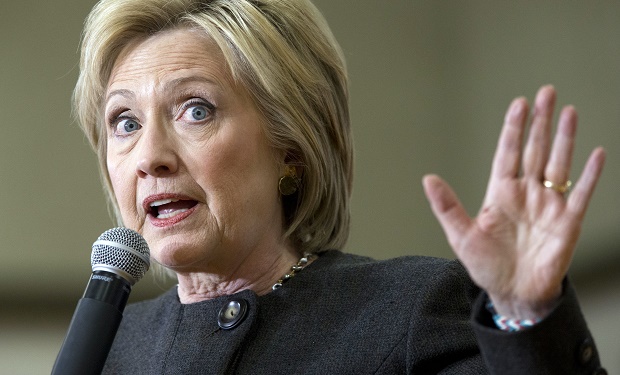
In this Jan. 25, 2016, photo, Democratic presidential candidate Hillary Clinton speaks during a campaign event at the Knoxville School District Administration Office in Knoxville, Iowa. AP Photo
DES MOINES, United States—Since her school days, Hillary Clinton has chased success, earning honors and accolades that could fill a bookcase. The ambitious Midwesterner has managed it all in her lengthy career—all except the presidency, her decades-long obsession.
Clinton might have been forgiven for expecting a glide path to her party’s nomination in 2016, after losing out to Barack Obama eight years earlier.
She and husband Bill Clinton have not just endured but suffered and thrived in symbiotic tandem under the political spotlight since 1977, the year before Bill’s election as governor of Arkansas.
Now she is in the fight of her life against chief rival Bernie Sanders, who is seeking to imitate Obama and snatch victory from Clinton’s grasp in Iowa, the state that votes first in the presidential nomination battle.
Clinton has changed tack for this new campaign. She promotes her status as a new grandmother, but also as the torchbearer of America’s women, a commitment that dates back to her early years as a lawyer and child advocate.
Embracing her reputation as a “fighter,” Clinton is keen to shed the has-been label and emerge as the nation’s first female president.
From middle-class to Yale
Hillary Diane Rodham was born October 26, 1947 and raised in a middle-class household in Chicago suburb Park Ridge.
She adored her mother Dorothy but described her father Hugh Rodham, born from Welsh immigrants, as a stubborn and rigid taskmaster.
He imposed his work ethic on young Hillary, but also his frugality. She still puts uneaten olives back in the jar and is loath to waste anything, she wrote in her 2003 autobiography, “Living History.”
Clinton shared her father’s Republican convictions in adolescence, as well as his thunderous laugh. The family is Methodist, and to this day Hillary Clinton remains in the church.
From age 13, she took odd jobs to help finance her studies. Smart and ambitious, Hillary was admitted in 1965 to Wellesley, an elite women’s college near Harvard where she was eventually elected president of her class.
It was the social tumult of the sixties, and Clinton’s eyes were opened to the struggle for civil rights, the explosive debate over Vietnam and the fight for gender equality.
When she was accepted in 1969 at prestigious Yale Law School, she met Bill Clinton, the “Viking” from Arkansas who would change the course of her life.
After working for the influential Children’s Defense Fund, and a period in Washington in 1974 on the commission investigating the Watergate scandal, she gave in and joined Bill in Arkansas.
He was soon elected Arkansas governor and Hillary Rodham joined a prestigious law firm, eventually becoming its first female partner. Chelsea, their only daughter, was born in 1980.
Political first lady
She soon dropped her maiden name and became Hillary Clinton, first lady of Arkansas and then the nation after her husband’s White House election victory in 1992.
Her assertive style contrasted with that of her predecessors. She played an active political role, symbolized by the location of her office in the West Wing.
Her relations with lawmakers and journalists quickly soured, particularly over her efforts to reform the health care system, a role bestowed on her by her president husband. Republicans branded her a radical feminist.
She suffered intense humiliation when news of Bill’s affair with White House intern Monica Lewinsky surfaced in 1998. But her popularity has never been higher than the 67-percent approval rating she enjoyed in December 1998, according to a Gallup poll at the time.
Solo career
Pressured by friends and associates in Hillaryland, the first lady launched herself into politics, winning a US Senate seat for New York in 2000.
She laid low during the 2004 presidential race, but four years later she entered the fray to challenge fellow senator Barack Obama, who savaged her vote supporting the Iraq war.
Clinton chose to run on her experience, refusing to campaign on gender. But Americans opted instead on the 40-something political neophyte Obama, bringing hope of change after eight years of George W. Bush.
After a detente with his party rival, Obama appointed Clinton secretary of state.
Her critics argue she can claim no major diplomatic successes, but her four globe-trotting years in the post cemented her image as a powerful stateswoman.
In 2007, in his definitive Clinton biography, journalist Carl Bernstein cited his subject’s dominant characteristic as “passion,” exuded in her “enthusiasm, humor, tempestuousness, inner strength,” and her “lethal (almost) powers of retribution.”
A Machiavellian image, one painted by her many enemies, clings to Clinton, especially in the eyes of voters who remember the turmoil of the 1990s.
Her use of a personal email account instead of an official government one proved a crippling scandal for her last year, fuelling suspicions that the Clintons see themselves as above the law.
In 2014 Hillary Clinton said she and Bill were “dead broke” when they left the White House, even though they owned two million-dollar homes. They subsequently made several million dollars each from speaking fees.
But her years of diplomacy have cemented her image. For the last 14 years, she has remained the most “admired” woman in America in an annual Gallup survey.
RELATED STORIES
Hillary Clinton likens Republican views on women to terrorists’
Hillary Clinton rallies Fil-Am, Asian supporters